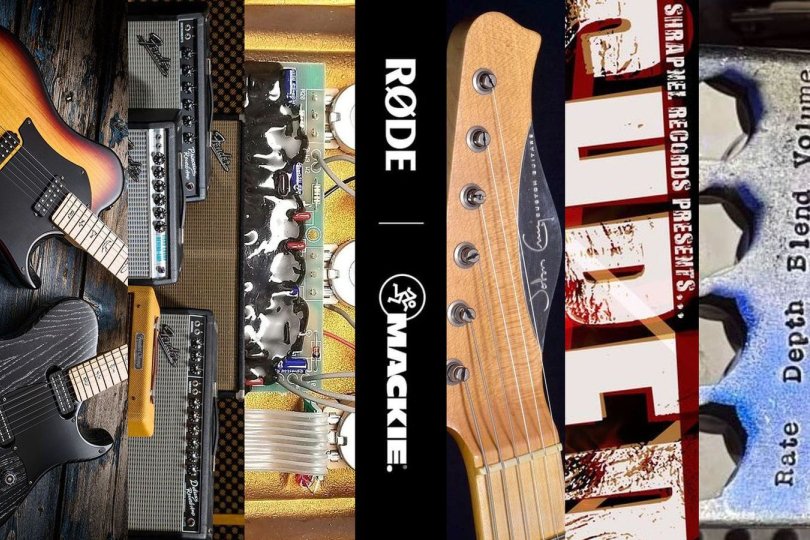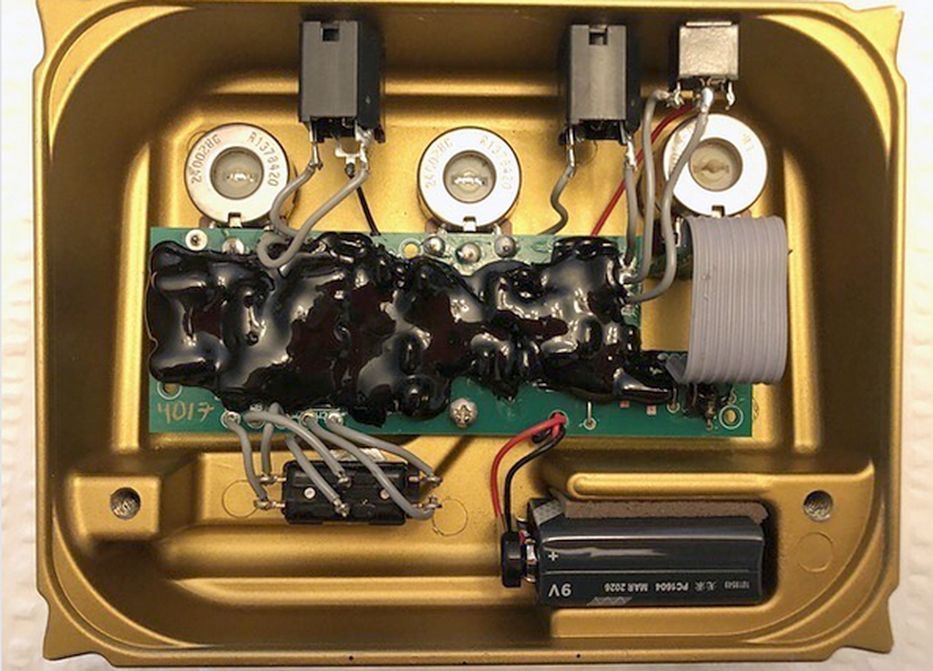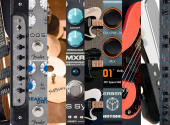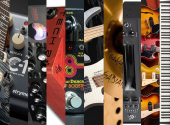
What the Year 2023 Brought to Musicians
What are the best-selling PRS guitars of 2023? Why isn't legendary producer Mike Varney rooting for today's shredders? The designer of the iconic Klon drive warns against its fakes. Guitarist Mark Tremonti is starting his own brand. Rode bought the Mackie company. Why did Behringer reject Moog's offer? The choice of musical instruments and gear topics in this article is going to be subjective, as well as the list of subjects above. We would be all the more pleased if you could contribute your own tips on key music industry events in 2023 in the discussion below the article.
1. The best-selling PRS models are the "Telecasters" NF 53 and Myles Kennedy
In the past, the most popular models from Paul Reed Smith were the Custom 24 versions, which were then followed by the Strat Silver Sky edition, based on the preferences of guitarist John Mayer. This year, however, the imaginary throne was claimed by the Telecaster-styled PRS NF 53, followed by the related Myles Kennedy signature model. Both guitars have been a success even though they were only launched in June this year. Note that this information refers exclusively to instruments from American workshops.
According to the manufacturer's overview, the third place belongs to the above-mentioned PRS Silver Sky variant, the fourth position is occupied by the immortal PRS Custom 24 and the fifth place is held by the luxurious PRS Modern Eagle V. The company also listed the most popular finishes, which were led by the light grey Moc Sand, leaving behind the transparent Black Doghair finish and the Faded Whale Blue, Yellow Tiger and Cobalt Smokeburst. Employees at the Maryland-based PRS factory spent a total of 219,316 minutes, or more than 3,600 hours, making guitars this year.
2. Bill Finnegan warns against Klon Centaur forgeries
The designer of the mythical overdrive Klon Centaur, whose prices on eBay have soared above 10,000 dollars this year, warns about the ever-increasing number of fakes posing as originals. That's why Klon creator Bill Finnegan decided to share some tips on Instagram on how to recognise models from his workshop.
"A dead giveaway that this is a fake unit is the die-cast enclosure: note the three circular flash impressions in the casting (two of which are on either side of the footswitch)," Finnegan wrote regarding a photo of a copy of the Klon sent to him by one of the tricked owners. "Note also the raised portion of the fin that creates the battery compartment – that raised portion does not exist in any of the sand-cast enclosures used in genuine Centaur units." The designer also recommends a closer inspection of the type of potentiometers, which quite often differ from the versions installed in the originals. Further tips are provided in the video below.

3. Former Fender Custom Shop guitar maker goes bankrupt
John Cruz, a former elite guitar maker for Fender's Custom Shop division who had been fired by the company in 2020 over a controversial Facebook post, started a brand called John Cruz Custom Guitars, dedicated to making boutique instruments, mostly Telecaster or Stratocaster-based. However, the company began to struggle financially during the COVID-19 pandemic, and Cruz had to declare bankruptcy. Even before this information was officially confirmed, the company's website ceased to function, and a German distributor, ProGuitar, complained about the manufacturer's behaviour, as the brand failed to deliver pre-paid instruments.
"I made good faith advances of several hundred thousand Euros in 2021 for instruments to be made by his company John Cruz Customs Guitars, LLC. Only a portion of those instruments were ever delivered, some of them with serious quality control problems. As of last October, a sizeable number still remained un-delivered. I recently got an email from a lawyer representing John that informed me John’s company had gone out of business, disposed of all of its assets. My deposit money still owed me was gone, and there was no hope of receiving that back nor any more of the guitars I had paid for two years ago," said ProGuitar.
4. Rode took over the Mackie brand – what about the acquisition of Moog by Behringer?
Australian company Rode took over rival brand Mackie at the end of the year, strengthening its mother company Freedman Group while creating a new "audio superpower" that is expected to gain a relatively large share of the global market, including the fast-growing areas of podcasting and streaming. The upcoming NAMM 2024 music trade show could see the first products combining the best of both brands, i.e. Rode microphone systems and Mackie mixers or monitors. The deal, technically a combination of cutting-edge technology and years of experience, is worth $180 million and should not be affected by the almost ubiquitous Chinese capital.
There was also speculation on musician websites this year about a second major acquisition – on its Facebook account, Behringer announced that Moog CEO Mike Adams had approached Behringer boss Uli Behringer over the sale of this traditional American brand. However, the Asian giant with German roots reportedly turned down the offer due to differences in business models. "Mike’s decision to sell Moog was influenced by his advanced age and serious mistakes made on the supply chain side. The company had purchased excessive inventory, leading to significant cashflow constraints," said Behringer.
5. Alter Bridge guitarist starts his own effects label
Companies that manufacture effects, instruments, amplifiers, and more, founded by well-known musicians (e.g. Abasi Concepts, Solar Guitars, KHDK, Wylde Audio, etc.), are seeing significant success in today's market. This category of brands is soon to be expanded by another manufacturer, this time by Alter Bridge guitarist Mark Tremonti, who revealed in an interview earlier this year that he was testing a trio of pedals to be produced by his own brand. One of the first models from the still not officially named company should be the Uni-vibe, whose prototype Tremonti unveiled during the presentation of his current gear (see the video below).
6. Guitar talent hunter Mike Varney feels apprehensive about the current wave of shredders
The founder of Shrapnel Records, the label that was the ticket to the world stage for many 80s guitar shredders, said in an interview that the playing of today's young, technically superior players is not his cup of tea. "I still love technical guitar playing, but I listen to many other kinds of music, too," he noted and added: "It's tough for me to listen to many of the newer technical players out there today as either they are just rehashing things Shrapnel artists did 40 years ago, or they've gotten faster and are playing seven and eight-string guitars."
"I can appreciate some of that stuff, but I don't enjoy it, as a lot of it sounds as if its sole reason for existing is to facilitate crazier guitar playing. I'm not looking for anything faster than the fastest things we put out, or that has so many time changes in it that they appear to exist to try to make something sound as complex as possible. I think part of it is my age."
7. Fender deferred $100 million worth of retail sales last year
While the last topic refers to 2022, Fender has been affected by the situation this year as well – the Californian company announced in August that it had to cancel a total of $100 million worth of product distribution last year, which, according to the guitar giant's CFO Matt Janopaul, represents roughly 600,000 guitars and 200,000 amplifiers. The drop in interest came after a lockdown period, which was rich in marketing, with online stores significantly boosting sales of mainly electric and acoustic guitars. The company had to address the subsequent drop in orders by building new warehouses for unsold instruments, amplifiers, and more, as well as cutting operating costs, including slowing down production on some lines.
If you have found an error or typo in the article, please let us know by e-mail info@insounder.org.





